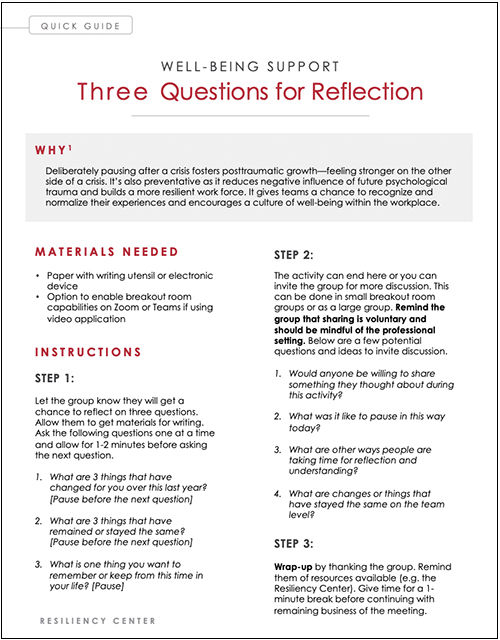eliberately pausing after a crisis fosters posttraumatic growth—feeling stronger on the other side of a crisis. It’s also preventative as it reduces negative influence of future psychological trauma and builds a more resilient work force. It gives teams a chance to recognize and normalize their experiences and encourages a culture of well-being within the workplace.
Three questions for reflection activity
Quick Tips

Tools for teams: Download the guide (4-pages) and Reflection Activity to use at your next team meeting.
Materials needed: paper with writing utensil or electronic device; optional to enable breakout room capabilities on Zoom or Teams if using video application
Instructions: Let the group know they will get a chance to reflect on three questions. Allow them to get materials for writing. Ask the following questions one at a time and allow for 1-2 minutes before asking the next question.
-
What are 3 things that have changed for you over this last year?
-
What are 3 things that have remained or stayed the same?
-
What is one thing you want to remember or keep from this time in your life?
The activity can end here or you can invite the group for more discussion. This can be done in small breakout room groups or as a large group. Remind the group that sharing is voluntary and should be mindful of the professional setting. Below are a few potential questions and ideas to invite discussion.
-
Would anyone be willing to share something they thought about during this activity?
-
What was it like to pause in this way today?
-
What are other ways people are taking time for reflection and understanding?
-
What are changes or things that have stayed the same on the team level?
Wrap-up by thanking the group. Remind them of resources available (e.g. the Resiliency Center). Give time for a 1-minute break before continuing with remaining business of the meeting.
Facilitator Tips
- Scripts make hard conversations easier. It sometimes feels awkward to follow a script. However, these scripts incorporate Trauma Informed Care Principles designed to help keep the team’s conversation safe. Deviate a little to feel less robotic, but trust the process.
- Make it clear that participation is optional. To empower the participants’ sense of choice, state that this activity is voluntary at the beginning. It is okay to sit this one out.
- Resist the urge to “fix it.” For those who participate, there is no need to fix or solve anything that comes up. Support can be given to those who choose to discuss simply by listening and validating their experience. The “say this/not this” table below has great go-to phrases that are often all that is needed. For more information on validation, read here. You can also request that someone from the Resiliency Center guide your group in this activity by emailing resiliencycenter@hsc.utah.edu.
| Say This | Not That |
|---|---|
|
That sounds really tough. |
You shouldn’t feel that way. |
|
That’s frustrating/scary/sad. |
We’ll get over it. |
|
There has been so much to worry about. |
You should think more positively. |
|
We’ve all been navigating so much uncertainty. |
You can’t think like that. |
|
I can tell how hard you’ve all worked. |
You should think more positively. |
| Thank you for sharing. | Unsolicited advice. (e.g. Have you tried…?) |
References
Olson K, Shanafelt T, Southwick S. Pandemic-Driven Posttraumatic Growth for Organizations and Individuals. JAMA. 2020;324(18):1829–1830. doi:10.1001/jama.2020.20275
Cite this content: Jean Whitlock, “How are we doing? Three Questions for Team Reflection”, Accelerate University of Utah Health curriculum, . Available at: http://accelerate.uofuhealth.utah.edu/explore/how-are-we-doing-three-questions-for-team-reflection
Megan Jean Whitlock
Pause practices are frequently used in the medical setting immediately following a traumatic event. The Resiliency Center’s Jean Whitlock shares a pause practice for 2020 to help teams recognize how far they’ve come—so we can all move forward together.
The U of U Health Resiliency Center shares a growing list of resources you and your team can use to continue building resilience together.
How do I share employee engagement feedback with my team? Chief Wellness Officer Amy Locke, Resiliency Center director Megan Call, Utah Health Academics HR leader Sarah Wilson, and Organizational Development Director Chris Fairbank explain when and how to talk with your team.
